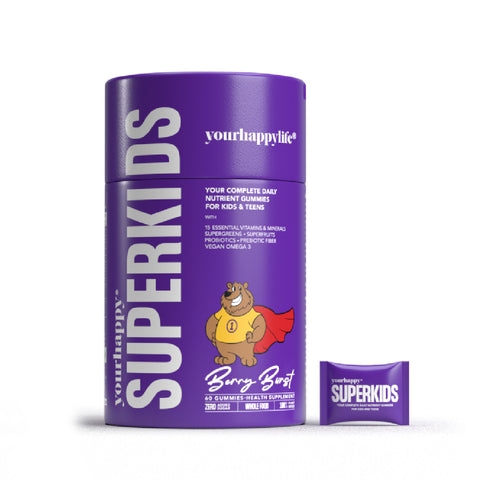News
Things to Know: Multivitamins Gummies in Your Kids' Diet

What are Multivitamin Gummies?

An Overview of Multivitamin Gummies
Multivitamin gummies are a type of dietary supplement designed specifically for children. They are formulated to provide a comprehensive blend of essential vitamins and minerals in a delicious, chewable format. These gummies are a convenient alternative to traditional vitamin tablets or capsules, making it easier for kids to meet their daily nutritional requirements.
Ingredients in Multivitamin Gummies
The ingredients in multivitamin gummies generally contain a combination of Prebiotic Fibre (Chicory Root Extract & FOS), Natural Apple Juice, Pectin, Whole Food Antioxidant SuperFruits Blend (Acai Berry, Acerola Cherry, Amla, Banana, BlackBerry, Black Cherry, Blueberry, Goji Berry & Pomegranate), Whole Food Active SuperGreens Blend (Broccoli, Kale, Moringa, Spinach & Spirulina), Pure Vitamins & Minerals Blend, Vegan Omega 3 (Flaxseed), Probiotics, Acidity Regulators (INS 330 & 331) & Natural Flavour.
Do Kids Need Multivitamin Gummies?

Understanding Nutritional Requirements for Children
Children have unique nutritional needs that vary based on their age, gender, and overall health. A well-balanced diet that includes a variety of fruits, vegetables, whole grains, lean proteins, and dairy products is typically sufficient to meet these requirements. However, certain factors may contribute to nutritional gaps in a child's diet.
Identifying Nutritional Gaps
Nutritional gaps can occur due to picky eating habits, limited food choices, allergies, or other dietary restrictions. Additionally, children with chronic medical conditions or certain developmental stages may require additional supplementation. It's important to consult with a pediatrician or a registered dietitian to determine if your child could benefit from multivitamin gummies.
Benefits of Multivitamin Gummies for Kids

Filling Nutritional Gaps
One of the primary benefits of multivitamin gummies is their ability to fill nutritional gaps in a child's diet. As mentioned earlier, children may not always get all the essential vitamins and minerals they need from their food alone. Multivitamin gummies provide a convenient and enjoyable way to ensure that children receive the necessary nutrients to support their overall health and well-being.
Boosting Immune Function
Multivitamin gummies can also help boost immune function in children. Vitamins such as vitamin C and vitamin D play a crucial role in supporting a strong immune system. By incorporating these vitamins into their daily routine, children may experience fewer instances of illness and have a better defense against common infections and diseases.
Supporting Healthy Growth and Development
Proper nutrition is essential for the healthy growth and development of children. Multivitamin gummies contain a range of vitamins and minerals that support various aspects of growth and development. For example, vitamin D is crucial for bone health and calcium absorption, while vitamin A promotes healthy vision and immune function. By providing these essential nutrients, multivitamin gummies for kids can contribute to optimal growth and development in children.
Choosing the Right Multivitamin Gummies

Reading the Labels
When selecting multivitamin gummies for your child, it's important to carefully read the labels and understand the ingredients. Look for gummies that contain a wide range of essential vitamins and minerals, preferably in their recommended daily amounts. Avoid products that contain excessive amounts of added sugars, artificial flavors, or unnecessary additives. Opting for gummies made with natural ingredients is generally a better choice.
Considering Allergies and Dietary Restrictions
If your child has any known allergies or dietary restrictions, it's crucial to choose multivitamin gummies that are safe for them to consume. Some gummies may contain common allergens like gluten, dairy, or soy. In such cases, look for gummies specifically labeled as allergen-free or consult with a healthcare professional for suitable alternatives.
Proper Dosage and Usage
Recommended Dosage Guidelines
Multivitamin gummies come with specific dosage guidelines that are typically based on a child's age and nutritional needs. It's important to follow these guidelines to ensure your child receives the right amount of vitamins and minerals without exceeding safe limits. Never exceed the recommended dosage unless advised by a healthcare professional.
Best Time to Take Multivitamin Gummies
The best time to give multivitamin gummies to your child may vary depending on their preferences and routine. Some children may prefer taking them with breakfast, while others may find it easier to remember before bed. Choose a consistent time that works well for your child and incorporate it into their daily routine for maximum effectiveness.
Are Multivitamin Gummies Safe for Kids?

Potential Risks and Side Effects
While multivitamin gummies are generally safe for kids, it's important to be aware of potential risks and side effects. Taking excessive amounts of certain vitamins and minerals can be harmful. For example, excessive vitamin A intake may lead to toxicity symptoms. Therefore, it's crucial to follow the recommended dosage guidelines and avoid giving additional supplements unless recommended by a healthcare professional.
Consulting with a Pediatrician
Before introducing multivitamin gummies or any dietary supplements to your child's routine, it's advisable to consult with a pediatrician. They can assess your child's specific nutritional needs, evaluate any potential risks or interactions with medications, and provide personalized recommendations based on their health profile.
Read More: The Benefits of Probiotics and Prebiotic
Common Myths and Misconceptions about Vitamin Supplements for Kids
Myth 1: "Vitamin supplements can replace a healthy diet."
Fact: While vitamin supplements can provide essential nutrients, they should never replace a healthy and balanced diet. Whole foods contain a variety of nutrients, fiber, and other beneficial compounds that are important for children's growth and development. Supplements should only be used to complement a well-rounded diet, not as a substitute.
Myth 2: "All kids need vitamin supplements."
Fact: Not all children require vitamin supplements. If a child consumes a diverse and balanced diet that includes fruits, vegetables, whole grains, lean proteins, and dairy products, they may meet their nutritional needs without supplements. It's essential to assess each child's diet and consult with a healthcare professional to determine if supplementation is necessary.
Myth 3: "More vitamins are always better."
Fact: Excessive vitamin intake can have adverse effects on a child's health. Some vitamins, such as vitamin A and vitamin D, can be toxic in high amounts. It's crucial to follow recommended dosage guidelines and avoid giving children additional supplements without the guidance of a healthcare professional.
Myth 4: "Vitamin supplements can cure or prevent illnesses."
Fact: While vitamins play a vital role in supporting immune function, vitamin supplements alone cannot cure or prevent illnesses. Good hygiene practices, a healthy lifestyle, and proper nutrition are essential for maintaining a strong immune system. Vitamin supplements should be seen as a way to address specific nutrient deficiencies, not as a magic solution for overall health.
Myth 5: "Natural vitamins are always better than synthetic ones."
Fact: Both natural and synthetic vitamins can be equally effective and safe. The body does not differentiate between the two once they are ingested. The most important factor is choosing a reputable brand that undergoes rigorous quality testing and adheres to manufacturing standards.
Also Read: Essential Guide to Growth Vitamins for Kids
How do multivitamin gummies for kids compare to traditional vitamin supplements?
Multivitamin gummies for kids have gained popularity as a convenient and enjoyable way to supplement children's nutrition. Let's compare them to traditional vitamin supplements to understand their differences:
-
Taste and Texture: Multivitamin gummies are designed to be appealing to children with their fruity flavors and chewy texture. Traditional vitamin supplements, on the other hand, often come in the form of tablets or capsules, which may be less appealing to kids who struggle with swallowing pills.
-
Ease of Consumption: Multivitamin gummies are easy to consume and do not require water for ingestion, making them convenient for kids on the go. Traditional supplements typically need to be swallowed with water, which may be more challenging for young children.
-
Enjoyment and Compliance: The enjoyable taste and texture of multivitamin gummies can make them more appealing to children, increasing compliance with taking their daily dose of vitamins. Traditional supplements may be seen as a chore or difficult to swallow, leading to resistance or inconsistency in taking them.
-
Variety and Formulations: Multivitamin gummies often come in a variety of formulations tailored specifically for children's nutritional needs, providing a comprehensive blend of essential vitamins and minerals. Traditional supplements may offer a wider range of options for specific nutrients, but they may require multiple pills or combinations to achieve the same level of nutrient coverage.
-
Absorption and Bioavailability: The absorption and bioavailability of vitamins and minerals in multivitamin gummies can vary depending on the formulation. Traditional supplements, especially those with specialized coatings or delivery systems, may have specific mechanisms to enhance absorption and bioavailability.
It's important to note that both multivitamin gummies and traditional supplements can play a role in supplementing children's nutrition. The choice between the two depends on factors such as a child's preferences, ease of consumption, and specific nutritional needs. Consulting with a healthcare professional or our Nutritionist can provide valuable guidance in determining the most suitable option for your child.
What are the key ingredients to look for when selecting the best multivitamin gummies?

Vegan Omega 3
Vegan omega-3 refers to omega-3 fatty acid supplements derived from plant-based sources, such as algae, flaxseeds, chia seeds, hemp seeds, and walnuts. These supplements are suitable for individuals following a vegan or vegetarian diet who want to ensure they are meeting their omega-3 fatty acid needs without consuming fish oil. Algae-based supplements are particularly popular among vegans as they provide a direct source of EPA and DHA, the two forms of omega-3s typically found in fish oil. Vegan omega-3 supplements offer a sustainable and ethical alternative for obtaining the essential fatty acids necessary for overall health and well-being.
Probiotics
Probiotics are live microorganisms that provide health benefits when consumed in adequate amounts. They are beneficial bacteria and yeasts that help restore and maintain a healthy balance in the gut microbiota. Probiotics can improve digestion, enhance nutrient absorption, alleviate digestive issues, and potentially support immune function. They can be found naturally in certain foods or taken as supplements, with different strains offering specific health benefits.
SuperGreens
1. Broccoli:- Broccoli is a nutrient-rich vegetable known for its vibrant green color and compact flower heads. It belongs to the Brassica oleracea species and is packed with essential vitamins, minerals, and dietary fiber. It is an excellent source of vitamin C, vitamin K, folate, and potassium. Broccoli also contains beneficial phytochemicals that may have potential cancer-fighting properties. This versatile vegetable can be enjoyed in various dishes and cooking methods, making it a healthy and delicious addition to a balanced diet.
2. Kale: Kale is a leafy green vegetable that belongs to the Brassica oleracea species, similar to broccoli and cabbage. It is known for its dark green, curly leaves and a slightly bitter taste. Kale is highly nutritious and is often referred to as a superfood. It is rich in vitamins A, C, and K, as well as minerals like calcium and iron. This nutrient-dense vegetable is also packed with antioxidants and dietary fiber, making it a great addition to a healthy diet. Kale can be enjoyed in salads, smoothies, stir-fries, or even baked as crispy kale chips.
3. Moringa: Moringa, also known as oleifera, is a nutrient-dense plant native to parts of Africa and Asia. It is often referred to as the "Tree of Life" due to its numerous health benefits. Moringa leaves, pods, and seeds are edible and packed with essential vitamins, minerals, and antioxidants. This superfood is rich in vitamin C, vitamin A, iron, calcium, and potassium. It is also known for its potential anti-inflammatory and antioxidant properties. Moringa can be consumed in various forms, such as dried leaves or powder, added to smoothies, and teas, or used in cooking, offering a nutritious boost to your diet.
4. Spinach: Spinach is a leafy green vegetable that belongs to the Amaranthaceous family. It is well-known for its vibrant green color and nutritional value. Spinach is packed with essential vitamins and minerals, including vitamin A, vitamin C, vitamin K, iron, and folate. This nutrient-dense vegetable is low in calories and high in fiber, making it a healthy addition to meals. It is also rich in antioxidants that help protect the body against oxidative stress. Spinach can be enjoyed raw in salads, sautéed as a side dish, or added to various dishes such as soups, smoothies, and omelets, providing both taste and nutritional benefits.
5. Spirulina: Spirulina is a blue-green algae that grows in freshwater lakes and ponds. It is a nutrient-rich superfood packed with essential vitamins, minerals, and antioxidants. Spirulina is known for its high protein content, making it a popular choice for vegetarians and vegans. It is also a good source of vitamins B, iron, and beta-carotene. This algae has been associated with potential health benefits, including boosting the immune system, reducing inflammation, and supporting cardiovascular health. Spirulina is available in powder or tablet form and can be easily added to smoothies, juices, or other recipes for a nutritional boost.
Read More:
What are the benefits of constantly taking multivitamins?

Nutritional Support: Multivitamins can provide essential vitamins and minerals that may be lacking in your diet. They act as a convenient and reliable source of nutrients, helping to fill nutritional gaps and support overall health.
Increased Energy Levels: Some multivitamins contain B-complex vitamins, such as B12 and B6, which play a vital role in energy production. By ensuring an adequate intake of these vitamins, multivitamins may help combat fatigue and promote increased energy levels.
Enhanced Immune Function: Many multivitamins include vitamins C, D, and E, along with minerals like zinc and selenium, which are known to support a healthy immune system. Regular use of multivitamins can help bolster your body's natural defense mechanisms, reducing the risk of infections and illnesses.
Improved Brain Function: Certain vitamins and minerals found in multivitamins, such as vitamin B12, omega-3 fatty acids, and antioxidants, are believed to contribute to brain health. These nutrients can support cognitive function, memory, and concentration, potentially promoting optimal brain performance.
Healthier Skin, Hair, and Nails: Multivitamins often contain vitamins A, C, and E, biotin, and other nutrients that contribute to healthy skin, hair, and nails. These vitamins and minerals play a role in collagen synthesis, cell regeneration, and protection against free radicals, helping to maintain vibrant and youthful-looking skin, strong hair, and robust nails.
When it comes to specific multivitamin brands, various reputable companies produce effective products. Some widely recognized and trusted companies such as the vitamin company. It's essential to choose a multivitamin that suits your specific needs, considering factors such as age, gender, and individual nutritional requirements.
Takeaway
Introducing a power-packed multivitamin+ for kids & teens that includes all the essentials they need every day. Soft chewables made from natural whole foods that provide a complete range of nutrients, from vitamins & minerals to phytonutrients (supergreens), antioxidants (superfruits), vegan omega-3 (flaxseed), probiotics, & fiber.
YourHappy SuperKids (Gummies)

Daily Dose of Essential Nutrients For Kids & Teens
These full-spectrum gummies are designed to bridge the gaps in their daily nutrition. Additionally, they help boost growth, enhance cognitive function, and improve immunity & vision. The essential daily multivitamin+ for growing minds & bodies.
FAQ'S
Can children's gummies replace a balanced diet?
Although these gummies are a great source of vitamins and minerals, a balanced diet should always be the priority. These are designed to support a balanced diet and guarantee your child gets the nourishment they need
Can multivitamin gummies have any side effects?
While side effects are rare, excessive consumption of multivitamin gummies can lead to an overdose of certain vitamins, resulting in adverse effects. It's crucial to adhere to the recommended dosage and consult a healthcare professional if you have any concerns.
Are multivitamin gummies a substitute for a healthy diet?
Multivitamin gummies should not replace a balanced and nutritious diet. They are meant to complement a healthy eating plan and ensure adequate intake of essential nutrients.
Read more articles collections:
Nutritional Myths: 10 Dispelled | Macromolecular Nutrition | Probiotics in Nutrition | Best Multivitamins for Men | How to Choose a Multivitamin | When Should Kids Start Taking Vitamins? | The Benefits of Probiotics and Prebiotic | Essential Guide to Growth Vitamins for Kids | Tips for Getting Your Child to Take Their Daily Multivitamin Gummies | Multivitamin gummies can support brain development | Vitamin D for Kids – Why It Is Essential? | children's mental health and well-being. | Children's Bone and Dental Health | Vitamins & Minerals to Boost Metabolism in Teens











































